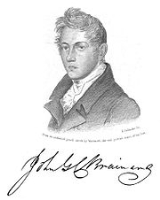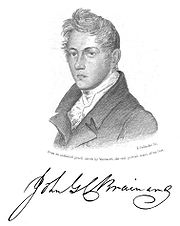
John Gardiner Calkins Brainard
Encyclopedia

Lawyer
A lawyer, according to Black's Law Dictionary, is "a person learned in the law; as an attorney, counsel or solicitor; a person who is practicing law." Law is the system of rules of conduct established by the sovereign government of a society to correct wrongs, maintain the stability of political...
, editor
Editing
Editing is the process of selecting and preparing written, visual, audible, and film media used to convey information through the processes of correction, condensation, organization, and other modifications performed with an intention of producing a correct, consistent, accurate, and complete...
and poet
Poet
A poet is a person who writes poetry. A poet's work can be literal, meaning that his work is derived from a specific event, or metaphorical, meaning that his work can take on many meanings and forms. Poets have existed since antiquity, in nearly all languages, and have produced works that vary...
.
Biography
John Brainard was born in New London, ConnecticutNew London, Connecticut
New London is a seaport city and a port of entry on the northeast coast of the United States.It is located at the mouth of the Thames River in New London County, southeastern Connecticut....
in October 1796, son of Jeremiah G. Brainard, formerly a judge
Judge
A judge is a person who presides over court proceedings, either alone or as part of a panel of judges. The powers, functions, method of appointment, discipline, and training of judges vary widely across different jurisdictions. The judge is supposed to conduct the trial impartially and in an open...
of the Connecticut Superior Court
Connecticut Superior Court
The Connecticut Superior Court is the Connecticut state trial court of general jurisdiction. It hears all matters other than those heard by the Connecticut Probate Courts...
. He was a descendant of Lion Gardiner
Lion Gardiner
Lion Gardiner , an early English settler and soldier in the New World, founded the first English settlement in what became the state of New York on Long Island. His legacy includes Gardiners Island, which is held by his descendants.-Early life:...
, an early English settler and soldier in the New World, founded the first English
English people
The English are a nation and ethnic group native to England, who speak English. The English identity is of early mediaeval origin, when they were known in Old English as the Anglecynn. England is now a country of the United Kingdom, and the majority of English people in England are British Citizens...
settlement in what became the state of New York
New York
New York is a state in the Northeastern region of the United States. It is the nation's third most populous state. New York is bordered by New Jersey and Pennsylvania to the south, and by Connecticut, Massachusetts and Vermont to the east...
. His legacy includes Gardiners Island
Gardiners Island
Gardiners Island is a small island in the town of East Hampton, New York, in eastern Suffolk County; it is located in Gardiners Bay between the two peninsulas at the eastern end of Long Island. It is long, wide and has of coastline...
which remains in the family and is the largest privately owned island in the United States.
He was tutored at home by an elder brother, and entered Yale College
Yale College
Yale College was the official name of Yale University from 1718 to 1887. The name now refers to the undergraduate part of the university. Each undergraduate student is assigned to one of 12 residential colleges.-Residential colleges:...
at the age of 15 in 1811. Biographies agree that he was not an attentive student, and it is uncertain if he graduated. Nevertheless on leaving college he was taken on as a student at law in his brother William F. Brainard's office.
By 1819 he had been called to the bar
Call to the bar
The Call to the Bar is a legal term of art in most common law jurisdictions where persons must be qualified to be allowed to argue in court on behalf of another party, and are then said to have been "called to the bar" or to have received a "call to the bar"...
and moved to Middletown
Middletown, Connecticut
Middletown is a city located in Middlesex County, Connecticut, along the Connecticut River, in the central part of the state, 16 miles south of Hartford. In 1650, it was incorporated as a town under its original Indian name, Mattabeseck. It received its present name in 1653. In 1784, the central...
, apparently to set up his own practice. In fact, he seems to have been apathetic about a legal career, feeling that his nature was too sensitive for such a profession. Some of his earliest poems are from this period of his life, published in a New Haven
New Haven, Connecticut
New Haven is the second-largest city in Connecticut and the sixth-largest in New England. According to the 2010 Census, New Haven's population increased by 5.0% between 2000 and 2010, a rate higher than that of the State of Connecticut, and higher than that of the state's five largest cities, and...
literary paper, The Microscope published by one Cornelius Tuthill.
In February 1822, he was engaged as editor of the Connecticut Mirror in a bid to further a literary career. Again, biographies agree that this was not the ideal job for him, and that "his temperament was totally unsuited to rough collissions of editorial controversy". In this role he published a number of his own works within the newspaper, which were well received and led to a literary reputation for Brainard.
He appears to have been well known and well thought of in his community. He is known to have been a friend of McDonald Clarke
McDonald Clarke
McDonald Clarke was a poet of some fame in New York City in the early part of the 19th century. He was an influence on, and eulogized by Walt Whitman; but widely known as "the mad poet of Broadway", a label with which he identified...
, the so-called "Mad poet of Broadway".
In 1824-5 he published a first volume, Occasional Pieces of Poetry by John G. C. Brainard, being reprints of works first published in the Mirror, together with a miscellany of unpublished poems.
By the spring of 1827, he was in failing health, suffering from tuberculosis
Tuberculosis
Tuberculosis, MTB, or TB is a common, and in many cases lethal, infectious disease caused by various strains of mycobacteria, usually Mycobacterium tuberculosis. Tuberculosis usually attacks the lungs but can also affect other parts of the body...
. He returned to New London, giving up his Mirror role, but continuing to have poems published in it.
He died on September 26, 1828. A number of poets, including John Greenleaf Whittier
John Greenleaf Whittier
John Greenleaf Whittier was an influential American Quaker poet and ardent advocate of the abolition of slavery in the United States. He is usually listed as one of the Fireside Poets...
, wrote poems in his memory. A posthumous The literary remains of J.G.C. Brainard: with a sketch of his life was published in 1832, and revised and republished as The poems of John G. C. Brainard. A new and authentic collection. A number of his poems are reprinted in collections of poems.

